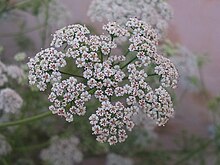Trachyspermum ammi
| Ajwain | |
|---|---|
 |
|
| Flowers of Trachyspermum ammi | |
| Scientific classification | |
| Kingdom: | Plantae |
| (unranked): | Angiosperms |
| (unranked): | Eudicots |
| (unranked): | Asterids |
| Order: | Apiales |
| Family: | Apiaceae |
| Genus: | Trachyspermum |
| Species: | T. ammi |
| Binomial name | |
|
Trachyspermum ammi Sprague |
|
| Synonyms | |
Ajwain, ajowan (/ˈædʒəwɒn/)Trachyspermum ammi, also known as Ajowan caraway,bishop's weed or carom, is an annual herb in the family Apiaceae. It originated in India and Pakistan. Both the leaves and the fruit (often mistakenly called seeds) of the plant are consumed by humans. The plant is also called bishop's weed, but this is a common name it shares with some other different plants. The "seed" (i.e., the fruit) is often confused with lovage "seed".
The small fruits are pale brown schizocarps and have an oval shape, resembling caraway and cumin. It has a bitter and pungent taste, with a flavor similar to anise and oregano. They smell almost exactly like thyme because it also contains thymol, but is more aromatic and less subtle in taste, as well as slightly bitter and pungent. Even a small number of fruits tends to dominate the flavor of a dish.
The plant is mainly cultivated in Iran and India.Rajasthan produced about 55% of India's total output in 2006.
The fruits are rarely eaten raw; they are commonly dry-roasted or fried in ghee (clarified butter). This allows the spice to develop a more subtle and complex aroma. In Indian cuisine, it is often part of a chaunk, a mixture of spices fried in oil or butter, which is used to flavor lentil dishes. In Afghanistan, the fruits are sprinkled over bread and biscuits.
...
Wikipedia
